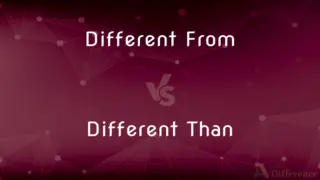Market Segmentation vs. Target Market — What's the Difference?
By Tayyaba Rehman — Published on November 7, 2023
Market Segmentation divides a market into distinct groups, while Target Market is the specific group businesses aim to reach with products/services.

Difference Between Market Segmentation and Target Market
Table of Contents
ADVERTISEMENT
Key Differences
Market Segmentation is the process of categorizing the overall market into distinct subsets based on shared characteristics, ensuring businesses understand the diversity of potential customers. In contrast, the Target Market represents the specific segment or group of segments a company has identified as the most likely to buy their product or service.
By understanding Market Segmentation, businesses can identify a range of potential customer groups. However, with the identification of the Target Market, the focus narrows down to cater specifically to the most promising segment.
The importance of Market Segmentation lies in its ability to provide a clear insight into varying customer needs and preferences. On the other hand, pinpointing a Target Market ensures resources are efficiently allocated to reach and engage those most likely to convert.
Simply put, while Market Segmentation provides a broad overview of the market landscape, a Target Market provides a sharp, focused direction for business strategies.
Comparison Chart
Definition
Dividing the market into subsets
Specific group targeted by a business
ADVERTISEMENT
Purpose
Understand diverse customer needs
Efficiently allocate resources and efforts
Basis
Shared characteristics like demographics or behavior
Potential to buy a product/service
Outcome
Multiple market segments
Focus on one or more selected segments
Application
Initial analysis and insight
Direct marketing and advertising strategies
Compare with Definitions
Market Segmentation
Dividing consumers based on shared characteristics.
Shoe companies might use Market Segmentation to categorize customers by age groups.
Target Market
Focus of a company's advertising strategies.
The toy's Target Market is parents with children aged 3-5.
Market Segmentation
Process of understanding diverse consumer needs.
Through Market Segmentation, a tech firm realized older adults prefer user-friendly interfaces.
Target Market
Segment selected based on its revenue potential.
Their luxury watch's Target Market is affluent individuals.
Market Segmentation
Identification of various market subsets.
The makeup industry uses Market Segmentation to cater to different skin types and tones.
Target Market
The specific consumer group a business aims for.
The brand's Target Market is health-conscious young adults.
Market Segmentation
Analysis tool to differentiate customer groups.
A car company used Market Segmentation to find which age group prefers electric vehicles.
Target Market
Chosen segment to direct marketing efforts.
After research, the company identified urban professionals as their Target Market.
Market Segmentation
The categorization of potential customers.
Market Segmentation revealed that millennials prefer online shopping over in-store.
Target Market
Group most likely to purchase a product/service.
The eco-friendly product's Target Market is environmentally-aware consumers.
Common Curiosities
Which comes first, Market Segmentation or identifying the Target Market?
Market Segmentation usually comes first, followed by the identification of the Target Market.
Why is Market Segmentation essential?
Market Segmentation provides insight into varying customer needs, allowing businesses to cater to specific groups effectively.
How does Target Market relate to marketing strategy?
A Target Market dictates where a business should direct its marketing and advertising efforts for optimal results.
Can a product have more than one Target Market?
Yes, products can appeal to multiple Target Markets depending on their versatility and appeal.
Can a single product appeal to different market segments?
Yes, a product can appeal to multiple segments, each with different reasons for purchasing.
What does Market Segmentation mean?
Market Segmentation involves dividing a larger market into subsets based on shared characteristics.
How specific can a Target Market be?
A Target Market can be very specific, focusing on factors like age, location, income, or buying behavior.
How does a company choose its Target Market?
Businesses select their Target Market based on research, identifying segments with the highest potential for sales.
Are demographics the only basis for Market Segmentation?
No, Market Segmentation can also be based on psychographics, behavior, geography, and other factors.
Can Market Segmentation change over time?
Yes, as consumer behaviors and preferences evolve, Market Segmentation can also shift.
Why is understanding the Target Market crucial for product development?
Knowing the Target Market helps design products that cater to the specific needs and preferences of that group.
How do businesses benefit from Market Segmentation?
Market Segmentation allows businesses to tailor their strategies, enhancing efficiency and ROI.
How does technology impact Market Segmentation?
Technology, especially data analytics, allows for more precise Market Segmentation by analyzing consumer patterns.
Is it possible for a company to change its Target Market?
Absolutely, companies can pivot and focus on a new Target Market based on market conditions and research.
How often should businesses review their Target Market?
Regularly, as market conditions, consumer behaviors, and competition can change, impacting the relevancy of the current Target Market.
Share Your Discovery

Previous Comparison
Supply Chain vs. Value Chain
Next Comparison
Different From vs. Different ThanAuthor Spotlight
Written by
Tayyaba RehmanTayyaba Rehman is a distinguished writer, currently serving as a primary contributor to askdifference.com. As a researcher in semantics and etymology, Tayyaba's passion for the complexity of languages and their distinctions has found a perfect home on the platform. Tayyaba delves into the intricacies of language, distinguishing between commonly confused words and phrases, thereby providing clarity for readers worldwide.













































